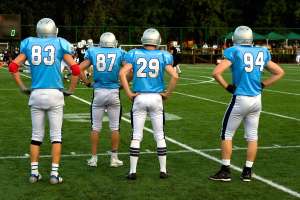 A hard blow or fall on the head can cause mild traumatic brain injury, or TBI, even if there is no loss of consciousness. This type of brain injury is also known as a concussion.
A hard blow or fall on the head can cause mild traumatic brain injury, or TBI, even if there is no loss of consciousness. This type of brain injury is also known as a concussion.
In the United States, brain injury is suffered most by young children under four years of age, teenagers, and adults who are past retirement age. While sports activities often lead to injury-related concussions in children, any jolt to the head can cause a concussion.
Parents should understand how to recognize concussion symptoms in children. Parents should also understand the treatment options and long-term management guidelines, which are detailed below.
Recognizing Physical Symptoms of Concussion
An injury to the head may cause the tender brain to be jostled inside the skull and hit the hard bony walls of the skull with force. This kind of impact can cause a concussion.
One symptom is a temporary loss of consciousness, but concussions can occur without any such period of being “knocked out.” Other physical symptoms to watch for include:
- Headache or eye pain
- Nausea and vomiting
- Light sensitivity
- Dizziness and balance issues
- Slurred speech
- Extreme tiredness
- Seeing “stars”
- Sleep disruption
Children and adolescents who suffer brain injury or concussion may also show problems with their coordination or with shortness of breath. You may witness personality changes, irritability, and confusion in a child who has suffered a concussion.
Recognizing Cognitive and Sensory Changes Due to Concussion
A concussion can also wreak havoc on your child’s neurological and cognitive functions. If this occurs, you will notice your child show (or complains of) an inability to concentrate on activities, including schoolwork, media, and games. Children and adolescents may become irritable or anxious when they can’t perform tasks and chores.
Sensory symptoms are also sometimes seen in patients who experience head injury. The symptoms include feeling strange twitches, “shocks,” or buzzing sensations. There may be strange feelings of being disassociated from one side of the face or body.
Vision problems can include double vision, blurred sight, and eye weakness. Many of the above symptoms are stronger in concussion patients who also suffer a great deal of pain from their head injuries.
Diagnosing Your Child’s Concussion
It’s important that you take your child to be evaluated as soon as possible after any injury to the head, no matter how minor the head bump seems. Even a relatively light jolt to the brain can cause significant impairment in certain cases.
Medical professionals have a variety of tests they can run to diagnose purely physical injury to the head. Evaluation using x-rays, MRIs, and other diagnostic methods catch cuts, wounds, and other trauma.
Cognitive and sensitivity injuries are a bit harder to recognize with machines or tests. Your child’s doctor will rely on you and your child’s reports about symptoms. Note any and all symptoms your child is feeling or displaying so your child’s physician can get a complete picture of the concussion’s effects on your child.
The physician may test the child’s blood, urine, and electrolyte levels to check for markers of injury or signs of impairment. The child’s balance may also be assessed for later comparison.
Treating the Concussion
Pain your child is experiencing can be treated with over-the-counter medications in most cases or with prescription medications in severe cases. Physical therapy and exercise may also be employed to help with sensory symptoms and lingering dizziness.
Physicians will recommend that your child take it easy for a time following the concussion. A very serious problem, called Second Impact Syndrome, can occur if a new head injury follows the first. For this reason, it’s vital that you make certain no activities that could lead to a secondary concussion are allowed. Your doctor will advise you when it’s safe for your child to resume sports and rougher play.
Your child may also be asked to take a break from TV, schoolwork, and other tasks and activities requiring focus and concentration. This time should include a break from playing video games and using phones and other devices. Doctors generally recommend rest of about a week to allow the brain to heal.
Managing Long-Term Concussion Issues
Most symptoms of concussion disappear after a short time. If physical, cognitive, or emotional symptoms linger or grow worse months after the head injury, the incident may have caused long-term changes in your child’s physical and neurological systems. Your child’s doctor may order additional therapies and treatments to help manage long-term concussion problems.
A neuropsychologist may be consulted to help you and your child understand and cope with the sensory and emotional changes resulting from a head injury. The neuropsychologist has an assessment tool known as the Glasgow Coma Scale (GCS) that uses 15 points to evaluate your child’s level of motor, verbal, and visual responsiveness.
After assessing your child, the neuropsychologist can offer treatment options, advice, and counseling to help you and your child understand the concussion and its effects on your child. The neuropsychologist will work with your child’s other medical professionals to devise treatments and therapies to help you and your child manage the concussion.
Contact NeuroHealth Arlington Heights today to discuss your child’s head injury. We’re here to support you and your child with state-of-the-art diagnostics and solution-oriented treatment.
